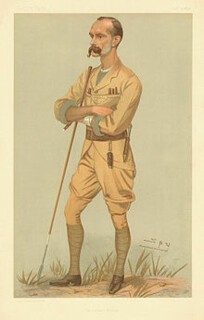Being Lord Lugard
Adéwálé Májà-Pearce
Frederick Lugard is a pivotal figure in Nigerian history. The colony’s first governor general, he effectively created and named it in 1914, amalgamating a multitude of disparate ethnicities, languages and religions into one of the most patchwork countries in the world. He compared the subjects he conquered to ‘attractive children’.
In 1894, Lugard had led an expedition through the ancient kingdom of Borgu on behalf of the Royal Niger Company, to secure treaties with the local emirs ahead of his French counterpart during the so-called European scramble for Africa. He succeeded except for the westernmost outpost of Nikki, which subsequently fell into what is now the Republic of Benin.
I was recently part of a 22-strong delegation which retraced Lugard’s steps through what is now Nigeria’s Middle Belt region. ‘The Race to Nikki’ was the slogan painted on our lead vehicle, along with a photo of Lugard. As the only ‘mixed-race’, ‘half-caste’, ‘biracial’ (what you will) person on the trip, and therefore a white man in the eyes of the world’s most populous black nation, I found myself co-opted as the reincarnation of Lord Lugard when our team leader took to introducing me as him wherever we went.
The trip was at the behest of the emir, who had asked us to deliver an invitation to a durbar in New Bussa, the spiritual seat of the emirate. We stressed at all eight of the palaces we visited that President Buhari would be present. The news was warmly received everywhere but Nikki, where we didn’t get to meet the ruler. As his spokesman explained after keeping us waiting for more than an hour, the notice of our coming had been too brief, although he assured us that His Highness would certainly honour the invitation.
On the fifteen-hour journey north back to Nigeria, my fellow passengers marvelled that we hadn’t been offered so much as a glass of water in all that tropical heat and dust, such is the continuing depth of Anglo-French rivalry so many decades after decolonisation. It’s also the case that Nikki, like Benin itself, is a small place dominated by Nigerians. We didn’t even have to change our money. The naira was accepted everywhere we went, and the only bank in town was Nigerian-owned.
At Illo, our last port of call, I was called on to say a few words in my capacity as Lugard’s heir. I didn’t hesitate to thank the emir, his chief imam, and the thirty or so chiefs and elders sitting cross-legged on the carpeted floor, for their hospitality. They accommodated us overnight, and we woke to find steaming bowls of pounded yam and as much chicken as we could eat, along with bread and tea, soft drinks and bottled water. This was extravagant by the standards we had enjoyed elsewhere, although we’d been received with generosity everywhere but Nikki. Someone later said that Illo, the most northern part of Borgu bordering the Sahel, was also the most impoverished.
Nigeria’s first prime minister, Alhaji Sir Abubakar Tafawa Balewa, said of the retreating colonial power: ‘We are grateful to the British officers whom we have known, first as masters, and then as leaders, and finally as partners, but always as friends.’ It was a gracious thing to say about a foreign conquering power which forced a multiplicity of unions into a country nobody really wanted. Within Nigeria, Borgu is divided among four of the country’s 36 states, making the Bariba people a minority in each of them.
The durbar will be held in December, and the emir of Nikki will doubtless attend, if only for the chance of meeting President Buhari and getting a few crumbs of Nigerian largesse. It will also be colourful. Back in New Bussa at the end of the trip, we were greeted by gorgeously clad horses mounted by boys of fifteen or thereabouts who escorted us to the palace to make our report. Having my picture taken in front of them was my last act as Lord Lugard. After four days on challenging roads at the tail end of the rainy season, I was glad to be rid of my unwanted predecessor.
Postscript, 2 November 2015
On the day that this piece was published, I heard that Haliru Dantoro, the emir of Borgu Kingdom who sent us on our mission, had died in a German hospital. He was 77 years old. By all accounts, he was instrumental in President Buhari’s victory at the polls in March, by bringing Buhari together with Asiwaju Bola Ahmed Tinubu. The emir’s principal private secretary, Nze Peter Nze, assures me that the durbar will still take place as planned, and Buhari will be there. The race is now on for the next emir and there is doubtless much politics involved. President Buhari will soon be arriving in the emirate, in part to honour the memory of the man who made his reincarnation possible. Buhari previously ruled between 1984 and 1985 as a military dictator in the bad old days of ‘orders is orders’, as the late Afrobeat king, Fela Kuti, put it.

Comments
This note is primarily a request that the Author should kindly keep me informed if and when the durbar will be staged and to please also include details as to how best to reach Borgu from Lagos. Thank you.